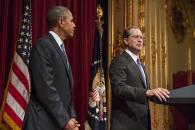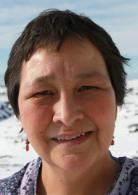This year, the Haffenreffer Museum and five other institutions (Portland State University, the University of Alaska-Fairbanks, the University of Alaska-Juneau, Northern Iowa University, and the Jefferson Institute) were awarded a $497,095 collaborative grant from the National Science Foundation to re-envision the United States' Arctic social science research and funding priorities for the next 10-20 years. The project Arctic Horizons: Social Science and the High North will bring nearly 200 circumpolar researchers, scholars, and community leaders to workshops at the five collaborating universities to provide guidance on the needs of Arctic communities and the community of social scientists working in the North.
Why is this necessary? Over the past 15 years, the Arctic has experienced substantial social and environmental transformations. Some are on pace with predictions from the late 1990s, but others have occurred much more rapidly than expected. Many shifts in the Arctic are linked to environmental change: changing sea ice and snow cover, displacement of modern villages, destruction of archaeological sites, questions of subsistence food security, increased shipping, tourism, and resource exploration – with their associated economic impacts (positive and negative), to name just a few. Other changes in the Arctic may be independent of changing climate: continued loss of Native languages; high rates of unemployment, domestic violence and substance abuse; and the increased influence of social media among and between isolated communities of the high North being just a few of these.
All of these transformations have impacts not only on the United States’ northernmost communities, but also on the global economic, social, and cultural systems studied by social scientists whose input provides information needed for adequate strategies guiding policy and community development.
NSF’s Arctic Social Sciences Program is the leading source of funding for U.S.-based social sciences research in the Arctic, yet the documents setting its research priorities were last updated in 1999. Findings from Arctic Horizons' five regional workshops and on-line input will be compiled into an updated vision that will help NSF shape future Arctic social science research priorities and inform Arctic economic, environmental, and political policy development.
Brown's workshop brings together Arctic researchers from Brown with peers from Finland, Norway, Iceland, Greenland, Canada, and the US to address issues of contemporary change, research priorities, and policy development in the North. Drawing upon the Museum's six-decades of engagement with northern people and northern heritage, and on the expertise of Brown University’s Watson Institute for International and Public Affairs and the Institute at Brown for Environment and Society (IBES), we hope to encourage connections and deeper exploration of the integration of broad-based social and natural scientific research in policy development and implementation.
 Mark Brzezinski with President Obama
Mark Brzezinski with President Obama
The workshop will open with a public keynote address, “The Arctic as a National Imperative,” by Mark Brzezinski, the Executive Director of the U.S. Arctic Executive Steering Committee. Mr. Brzezinski, former U.S. Ambassador to Sweden, was appointed to this position in 2015 by President Obama to coordinate U.S. actions, policies, and strategies for the Arctic. His presentation will examine the challenges, crises and opportunities that we as a nation and a global community face in the changing North, and the activities of the White House's Arctic Executive Steering Committee along with US departments and agencies to confront them. His address will be held on Tuesday, May 31, 6:00 p.m. at the Carmichael Auditorium, in the Institute at Brown for Environment and Society, 85 Waterman Street, Providence.
 Lene Kielsen Holm
Lene Kielsen Holm
A second keynote address by Lene Kielsen Holm (Research Scientist and Project Leader, Greenland Climate Research Centre) is open to workshop participants and Brown faculty. Her talk, “Ilisimatusarneq, issittumi nunat inoqqaavisa ilisimasaat ilanngullugit / Building New Knowledge from the Arctic by the Method of Knowledge Co-production” will explore intersections between western scientific approaches and the knowledge of indigenous people that are necessary to understand the changing Arctic.
Both keynote speeches and the open discussion portions of Brown's workshop will be live-streamed and accessible to the public at http://arctichorizons.org/node/36.
More information on Arctic Horizons, including the schedule and agenda for Brown's workshop, can be found at www.arctichorizons.org.